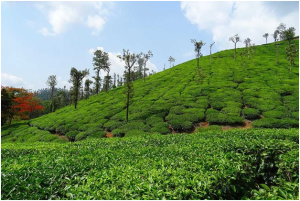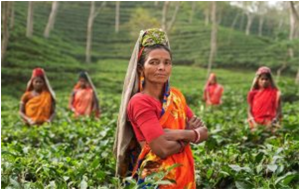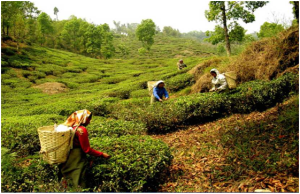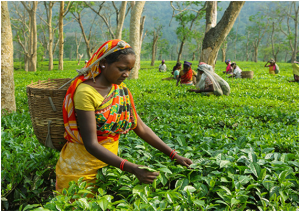
BY DR. RAVINDER PALL SAINI
INDIAN FOREST SERVICE ( RETIRED)
MEMBER, BOARD OF MANAGEMENT,
FOREST RESEARCH UNIVERSITY,
DEHRADUN.
DEHRADUN, 21 MAY 2024:

SIGNIFICANCE:
It is a day to celebrate the prolonged history, cultural significance, and economic impact of tea production and consumption worldwide. Raise awareness about the importance of sustainable tea production and consumption methods. Recognize the potential health benefits associated with tea consumption.
Celebrate the cultural heritage and enjoyment associated with tea consumption around the globe.
International Tea Day Theme 2024:
The United Nations later established a separate International Tea Day on May 21. This day focuses on the broader picture, celebrating tea’s long history, cultural significance, and its role in promoting sustainable development and fighting poverty in tea-growing regions.
Why drink tea?
Tea is a beverage made from the Camellia sinesis plant. Tea is the world’s most consumed drink, after water. It is believed that tea originated in northeast India, north Myanmar, and southwest China, but the exact place where the plant first grew is not known. Tea has been with us for a long time. There is evidence that tea was consumed in China 5,000 years ago.
Tea production and processing constitutes a main source of livelihoods for millions of families in developing countries and is the main means of subsistence for millions of poor families, who live in several least developed countries.

The tea industry is a main source of income and export revenues for some of the poorest countries and, as a labour-intensive sector, provides jobs, especially in remote and poor areas. Tea can play a significant role in rural development, poverty reduction and food security in developing countries, being one of the most important cash crops.

Tea consumption can bring health benefits and wellness due to the beverage’s anti- inflammatory, antioxidant, and weight loss effects. It also has cultural significance in many societies.
Honouring women around the world, from crop to cup:

This year, International Tea Day highlights women and their role in the tea sector. It is also an opportunity to celebrate the cultural heritage, health benefits and economic importance of tea, while working to make its production sustainable “from field to cup” ensuring its benefits for people, cultures and the environment continue for generations.

Highlights of International Tea Day:
Re-emphasizing the call from the Intergovernmental Group on Tea to direct greater efforts towards expanding demand, particularly in tea-producing countries, where per capita consumption is relatively low, and supporting efforts to address the declining per capita consumption in traditional importing countries, the General Assembly decided to designate 21 May as International Tea Day.
The Day will promote and foster collective actions to implement activities in favour of the sustainable production and consumption of tea and raise awareness of its importance in fighting hunger and poverty.
Tea production and the Sustainable Development Goals:
Tea production and processing contributes to the reduction of extreme poverty (Goal 1), the fight against hunger (Goal 2), the empowerment of women (Goal 5) and the sustainable use of terrestrial ecosystems (Goal 15).

Moreover, there is an urgent need to raise public awareness of the importance of tea for rural development and sustainable livelihoods and to improve the tea value chain to contribute to the 2030 Agenda for Sustainable Development.
Tea and climate change:
Tea production is highly sensitive to changes in growing conditions. Tea can only be produced in narrowly defined agro-ecological conditions and, hence, in a very limited number of countries, many of which will be heavily impacted by climate change.
Changes in temperature and rainfall patterns, with more floods and droughts, are already affecting yields, tea product quality and prices, lowering incomes and threatening rural livelihoods. These climate changes are expected to intensify, calling for urgent adaptation measures. In parallel, there is a growing recognition of the need to contribute to climate change mitigation, by reducing carbon emissions from tea production and processing.
Therefore, tea-producing countries should integrate climate change challenges, both on the adaptation and mitigation front, into their national tea development strategies.

History:
The roots of International Tea Day can be traced back to 2005.Trade unions, small tea growers, and civil society organizations in Asia and Africa launched the International Tea Day campaign. Their primary goal was to raise awareness about the challenges faced by tea producers, including fair prices for their crops and living wages for workers.
This campaign gained momentum within these regions, with initial celebrations held in countries like India, Sri Lanka, and Nepal. Official Recognition efforts at the UN came in between 2015-2019.
The movement for an official International Tea Day reached a turning point in 2015.
The Tea Board of India, a government agency, proposed the idea of an official UN- sanctioned International Tea Day to the FAO (Food and Agriculture Organization).

This proposal received support from various tea-producing countries like Kenya, Sri Lanka, and China. Over the next few years, member states of the FAO actively advocated for the establishment of International Tea Day.
The UN General Assembly adopted a resolution officially establishing May 21st as International Tea Day. This resolution acknowledged the social, economic, and cultural significance of tea, as well as its contribution to poverty reduction and food security, particularly in developing countries.

International Tea Day Today (2024):
Since its inception in 2020, International Tea Day has gained global recognition. The FAO coordinates the celebration each year, often focusing on specific themes related to sustainable production, fair trade practices, or the health benefits of tea.
International Tea Day 2024 doesn’t have a specific theme, but the emphasis likely remains on promoting sustainable practices throughout the tea production and consumption chain.
Tea outlook to 2027:
Global tea consumption and production are projected to keep rising over the next decade, driven by robust demand in developing and emerging countries. This will create new rural income opportunities and improve food security in tea-producing countries, according to the report “Current Market Situation and Medium-Term Outlook”,
(Source UN)

Advertisement:


































Add Comment